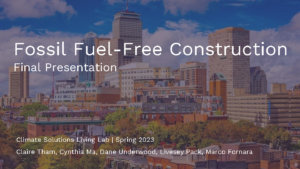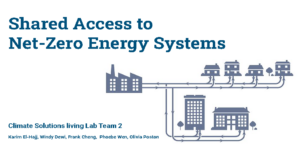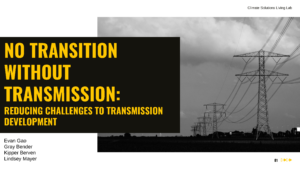The Climate Solutions Living Lab combines pedagogy and applied research to advance the climate change goals of Harvard and other institutions, governments and companies. Advanced students from graduate schools across Harvard University work in interdisciplinary teams to advance new, replicable and innovative steps to redress climate change. Students scrutinize the feasibility, scalability, and social justice impacts of climate change measures from multiple perspectives, including economic, technological, legal and health. Participants are pushed to think outside their expertise as they collaborate with peers from diverse academic backgrounds on complex, real world challenges. The students’ final work product includes analyses and tools that can be tested and further refined by on- and off-campus partners of the Living Lab.
Menu:
- Spring 2023 Climate Solutions Living Lab Projects
- Spring 2022 Climate Solutions Living Lab Projects
- Projects from Prior Years
- Student Testimonials
- Teaching Staff
Spring 2023 Climate Solutions Living Lab Projects
Click here to view: Implementation and Equity Considerations for Municipal Requirements for Fossil Fuel Free Construction

Click here to view: Sharing Access to Private Networked Geothermal Systems

Integrating Smaller Buyers into Consortium Power Purchase Agreements

Improving the Permitting Process for Clean Energy While Advancing Environmental Justice

Spring 2022 Climate Solutions Living Lab Projects
Integrating Carbon Removal into Climate Change Mitigation Commitments: Click here to view Team 3’s project presentation, “Carbon Removal Strategy for Harvard University”
Valuing Co-Benefits in Aggregated Purchasing of Carbon Offsets: Click here to view Team 1’s project presentation, “Innovation and Co-Benefits of Greenhouse Gas Offset Projects”
Combining Solar Generation and Agricultural Activities to Promote Synergistic Land Uses: Click here to view Team 4’s project presentation, “Microgrid Solar & Agrivoltaic Opportunities”
Designing Municipal Level Programs to Reduce Greenhouse Gas Emissions From the Building Sector: Click here to view Team 2’s project presentation, “BERDO 2.0: A Bird’s Eye View of Local Carbon Abatement Options”

Climate Solutions Living Lab – Spring 2022 Class
Projects from Prior Years
Spring 2020 Projects
Funding and catalyzing greenhouse gas emission reduction pilot and demonstration projects with university-based investment initiatives: Click here to view Team 1’s project presentation, “Harvard Catalytic Climate Initiative”
Reducing agricultural nitrous oxide and carbon dioxide emissions through the use of cover crops: Click here to view the Cover Crop Credit Partnerships Guide
Reducing greenhouse gas emissions from the operation of university athletic departments: Click here to view the Changing the Game: A Playbook for Reducing Greenhouse Gas Emissions at University Athletic Departments Manual
Spring 2019 Projects
Options for Replacing Halocarbon Refrigerants to Reduce Damaging Climate Impacts Manual
District Heating Using River Water Instead of Natural Gas
Anaerobic Digestion Opportunities for Food Waste
Anaerobic Digestion and Production of Biofuels on Dairy Farms in Wisconsin
High-Quality Carbon Offsets Through Improved Forest Management
Spring 2018 Projects
Reducing Emissions from Agriculture Sector Using Chestnut Trees for Alley Cropping
Anaerobic Digestion to Reduce Agricultural Greenhouse Gas Emissions
Spring 2017 Projects
Creating Marketable Offsets by Reducing Use of Nitrogen Fertilizer on Midwest Corn Farms
Public/Private Partnerships To Reduce Carbon Emissions And Improve Health In Rhode Island Schools
Carbon Offsets Via Forest Sequestration And Weatherization In Rural Alaska
Student Testimonials
Augusta Williams, Harvard T.H. Chan School of Public Health:
“The project I was assigned to during the Living Lab course, renewable energy credits for unregulated entities, was a topic I was not very familiar with, but learned so much from the experience. Working with students from the other Harvard schools and MIT was an invaluable experience that gave me vital experience for further team collaboration in my doctoral program. During a recent science policy fellowship I completed, I was tasked with completing a proposal on private sector greenhouse gas emissions. Initially I didn’t think I had much knowledge of this topic, but after diving in, realized all of my Living Lab experiences applied to this topic. I was able to complete the proposal with high praise and minor edits by the experts involved in the project, including scientists, lawyers, and policymakers.”
Dakota McCoy, Harvard University, Graduate School of Arts & Sciences:
“CSLL is not a typical course. CSLL brings together students from interdisciplinary backgrounds to address real-world problems. As a graduate student in biology, I mostly work in a narrow research area with other like-minded folks. CSLL placed me on a dynamic, interdisciplinary team with four brilliant women from the School of Public Health, the Kennedy School, the Graduate School of Design, and the Law School. I learned so much from the way they tackled problems and generated results; we all brought expertise and strategies from our own fields to the table. It was immensely rewarding to work on a real world problem– anaerobic digestion for emissions reduction– where our proposed solution actually may be implemented in the near future. CSLL is learning by doing: the course’s practical atmosphere was energizing and fulfilling. We all invested buckets of energy and time into our project, learned more than I would think possible in a single term, and made connections that I am sure will stretch far into the future. I strongly recommend CSLL: it is truly refreshing and energizing to step out of our bubbles at Harvard, interact with each other, and shoot for real-world solutions to the pressing problem of climate change.”
Veronica Saltzman, Harvard Law School:
“The Living Lab gave me the opportunity to get hands on, real world experience practicing in an area of law I’d never tried––energy law–– and a type of legal practice I’d never tried––transactional. More than any other course in law school, the Living Lab made me feel more prepared to enter the workforce. The other amazing part of the Living Lab is the amount I learned from other students on my team and on other teams. Because the course is multidisciplinary, students from different areas of study must learn to communicate, collaborate, and teach one another. I think it is truly important for law students to gain real-world legal experience and learn to collaborate with non-lawyers. This course gave me the opportunity to do both.”
Nick Eberhart, Harvard Law School:
“I found the CSLL to be the most rewarding and engaging class I have taken at Harvard. It provides a rare opportunity to do meaningful work, to learn from experts in industry and academia, and to help the university achieve its climate goals. Through the course, I felt more involved both in Harvard’s efforts and in the broader movement to address climate change. The CSLL is structured to be an interdisciplinary experience and I valued the opportunity to learn from other students across fields including engineering and business. We learned to communicate with people from diverse disciplines, which is something that is rare in graduate education and will be helpful for a career in the environmental field.”
Bridget Nyland, Harvard Business School:
“The Climate Solutions Living Lab was an unparalleled opportunity to both develop relationships with students passionate about climate change throughout the University and to get hands on experience doing the hard work of changing organizational behavior to reduce greenhouse gas emissions. In HBS case discussions, we often say ‘Well, we should work across the organization to change the policy and make lowering greenhouse gases a priority on the same line as profit,’ as if that is trivial. The Living Lab made clear how difficult that change can be and gave me the hands-on tactical experience to actually make it happen.”
Teaching Staff
The Climate Solutions Living Lab is taught by Aladdine Joroff and co-led by Debra Stump. In Spring 2022, Henry Tepper joined the course as an expert advisor and team supervisor. The program was developed and led by the late Professor Wendy Jacobs, who taught the course from 2017-2020.

